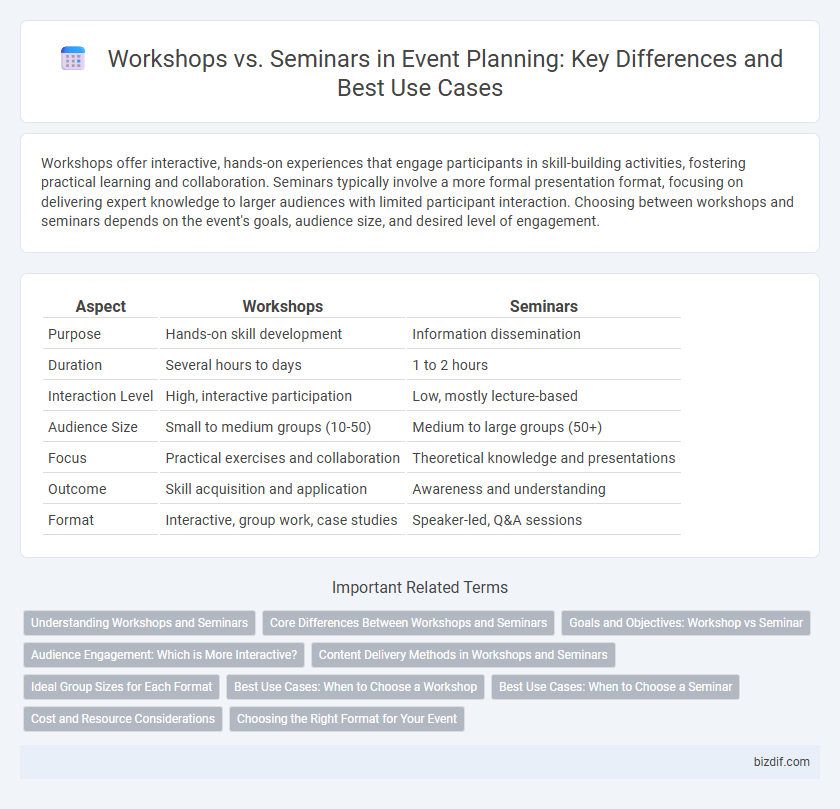Workshops offer interactive, hands-on experiences that engage participants in skill-building activities, fostering practical learning and collaboration. Seminars typically involve a more formal presentation format, focusing on delivering expert knowledge to larger audiences with limited participant interaction. Choosing between workshops and seminars depends on the event's goals, audience size, and desired level of engagement.
Table of Comparison
| Aspect | Workshops | Seminars |
|---|---|---|
| Purpose | Hands-on skill development | Information dissemination |
| Duration | Several hours to days | 1 to 2 hours |
| Interaction Level | High, interactive participation | Low, mostly lecture-based |
| Audience Size | Small to medium groups (10-50) | Medium to large groups (50+) |
| Focus | Practical exercises and collaboration | Theoretical knowledge and presentations |
| Outcome | Skill acquisition and application | Awareness and understanding |
| Format | Interactive, group work, case studies | Speaker-led, Q&A sessions |
Understanding Workshops and Seminars
Workshops provide hands-on, interactive experiences where participants actively engage in skill-building exercises, fostering practical learning and collaboration. Seminars are typically lecture-based sessions designed to deliver information from experts to an audience, emphasizing knowledge dissemination and discussion. Understanding the distinct formats helps planners tailor content and engagement strategies to meet attendee expectations and event objectives.
Core Differences Between Workshops and Seminars
Workshops emphasize interactive, hands-on learning experiences, fostering skill development through participant engagement and practical exercises. Seminars focus on passive information delivery, where experts present topics to an audience, prioritizing knowledge dissemination over active participation. The core difference lies in workshops' collaborative approach versus seminars' lecture-based format.
Goals and Objectives: Workshop vs Seminar
Workshops emphasize hands-on learning and skill development, focusing on interactive activities that enable participants to apply concepts practically. Seminars prioritize knowledge dissemination and discussion, aiming to inform attendees through expert presentations and theoretical exploration. Clear goals for workshops include mastering specific techniques, while seminar objectives target broad understanding and idea exchange within a subject area.
Audience Engagement: Which is More Interactive?
Workshops foster hands-on participation and small group collaboration, making them more interactive than seminars, which typically involve passive listening to presentations. Audience engagement in workshops is enhanced through activities, problem-solving tasks, and real-time feedback, encouraging deeper learning and skill application. Seminars, while informative, often lack the dynamic interaction that workshops provide, limiting participant involvement to Q&A sessions and note-taking.
Content Delivery Methods in Workshops and Seminars
Workshops use interactive, hands-on activities to engage participants actively, fostering skill development and practical application of concepts. Seminars primarily deliver content through lectures and presentations, focusing on information dissemination and expert insights to a larger audience. Effective event planning requires selecting the appropriate content delivery method to align with learning objectives and participant engagement levels.
Ideal Group Sizes for Each Format
Workshops typically accommodate smaller groups of 10 to 30 participants to foster interactive learning and hands-on activities. Seminars are better suited for larger audiences, often ranging from 30 to 100 attendees, allowing for more structured presentations and broader topic coverage. Choosing the ideal group size enhances engagement and ensures the effectiveness of the event format.
Best Use Cases: When to Choose a Workshop
Workshops are best chosen for hands-on learning experiences where active participation and skill-building are essential. They excel in scenarios requiring collaborative problem-solving, interactive training, or practical application of concepts. Selecting workshops enhances engagement and retention when the goal is to develop specific competencies within a smaller, focused group.
Best Use Cases: When to Choose a Seminar
Seminars are ideal for delivering focused, expert-led presentations to larger audiences seeking in-depth knowledge on specific topics. They work best when the goal is to share theoretical insights, professional updates, or industry trends without the need for interactive skill-building. Choose seminars to efficiently disseminate information to groups aiming for learning through listening rather than hands-on practice.
Cost and Resource Considerations
Workshops typically require higher costs and more resources due to interactive materials, hands-on activities, and smaller group sizes that demand more facilitators. Seminars generally involve larger audiences with lower per-person expenses, relying on presentations and minimal participant engagement, which reduces logistical complexity. Choosing between workshops and seminars depends on budget constraints and available staff, balancing depth of experience with cost-efficiency.
Choosing the Right Format for Your Event
Workshops provide interactive, hands-on experiences that promote skill development and active participation, making them ideal for training and team-building events. Seminars focus on delivering expert knowledge through presentations and discussions, suitable for large audiences seeking informational content. Selecting the right format depends on your event goals, audience engagement level, and the desired outcome, ensuring an impactful and relevant experience.
Workshops vs Seminars Infographic

 bizdif.com
bizdif.com